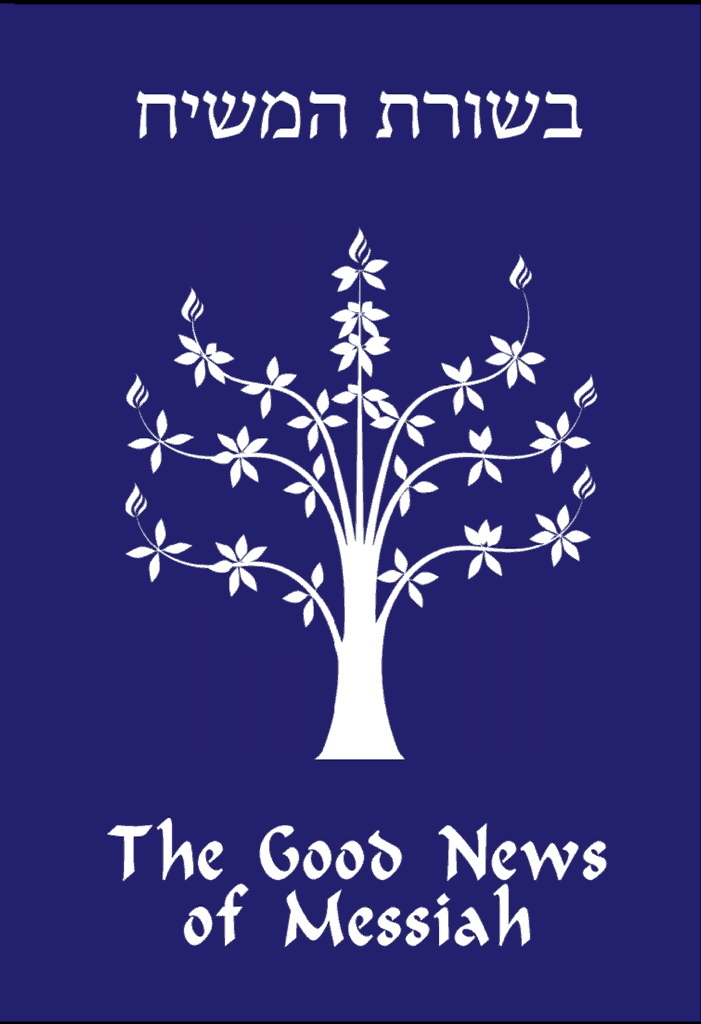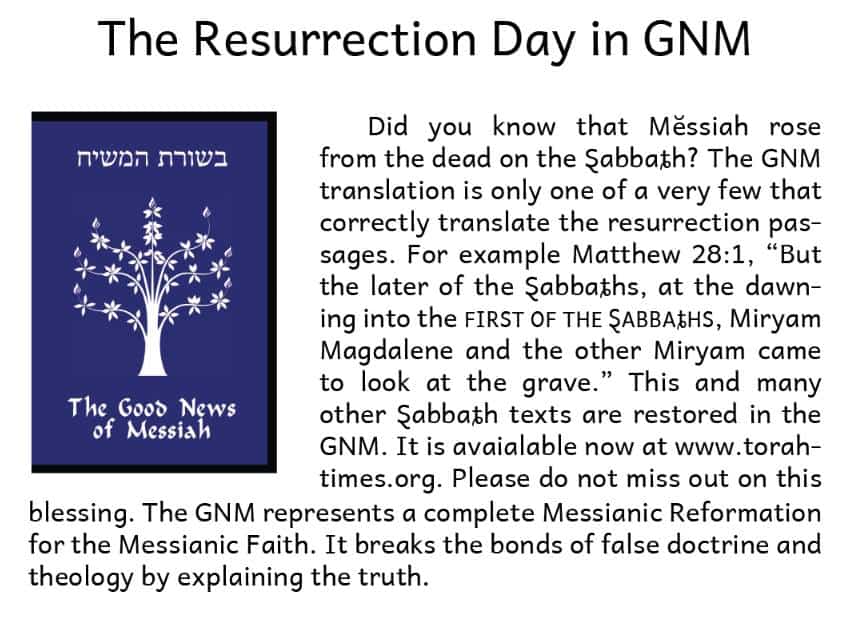About the Hebrew Roots Bible
 Any genuine scholar of scripture pondering their Christian-Hebrew Roots shouldn’t be without a copy of the Hebrew Roots Messianic New Testament Study Bible – the Good News of Messiah. Whether you are an enthusiastic newcomer to the faith, Bible study group, fellowship or individual, you shouldn’t be without out this epic edition.
Any genuine scholar of scripture pondering their Christian-Hebrew Roots shouldn’t be without a copy of the Hebrew Roots Messianic New Testament Study Bible – the Good News of Messiah. Whether you are an enthusiastic newcomer to the faith, Bible study group, fellowship or individual, you shouldn’t be without out this epic edition.
Do you feel your English translation is missing something? Still struggling reconciling passages and texts, and misleading nuances? Do traditional claims concerning biblical events and chronologies leave you floundering? The Hebrew Roots study Bible translation rightly corrects fabricated chronologies, and ill-hatched calendar assumptions. Conflicting passages, texts and faults found in traditional translations are amended using only definitions found in standard lexicons, thereby harmonising both Testaments.
The following three primary and central amendments concerning the words; ‘faith’, ‘justice’ and ‘law’ will be drawn into sharp scrutiny and focus throughout.
The Hebrew Roots Bible New Testament Study Translation
. . . . correctly renders and restores essential word groups definitions to their root meanings. For example:
What is Faith
Firstly, the word ‘faith’ word group (πίστις) is translated true to its original sense of fidelity, faithfulness, or a commitment to be faithful. Thus believing is an affirmation of faithfulness to the messiah, a commitment of loyalty to his cause, whereby faith is filled out to its full sense of faithfulness.
. . . and Justice
Secondly, the ‘justice’ word group (δικαιοσύνη) is correctly translated according to first- centuryGreek usage, ‘justice,’ ‘to justice’ (to administer justice), describing the activity of a judge trying a case. The word does not in this sense mean acquit, absolve, justify, or, declare righteous someone who is guilty. But it means to administer justice to someone, by pardon, by condemnation, or by acquittal. Only two of these three outcomes are possible for a guilty person, because the Almighty will not acquit the guilty. Therefore justice is administered to us by the faithfulness of messiah to the Covenant, not an acquittal, but a pardon for the guilty.
centuryGreek usage, ‘justice,’ ‘to justice’ (to administer justice), describing the activity of a judge trying a case. The word does not in this sense mean acquit, absolve, justify, or, declare righteous someone who is guilty. But it means to administer justice to someone, by pardon, by condemnation, or by acquittal. Only two of these three outcomes are possible for a guilty person, because the Almighty will not acquit the guilty. Therefore justice is administered to us by the faithfulness of messiah to the Covenant, not an acquittal, but a pardon for the guilty.
. . . and Law
Thirdly, words translated ‘Law’ (νόμος) are corrected, when they do not mean law as a complete code, but only a particular law that is applied in a case according to ‘what is customary,’ according to the ‘norm’. Nomos therefore means ‘what is customary’ for the law.
More Information
Reviews
Comparison
Translation Examples
Details
Author: Daniel Gregg
Publish Date: 23/08/2018
Language: English
Genre: New Testament Biblical Literature
ISBN: 978-0979190728
Page Count: 496 pages.
Binding: Hardcover, blue cloth. 6″ x 9″ trim, with dust jacket.
Postage Lead Time: 24-28 hrs.
Packaging: Book wrap with tear open strip.
Retailers, Pricing and Ordering
Amazon
eBay
Hebraic Roots
TorahTimes (USA only)
Recent Review
After reading the Hebrew Roots Study Bible third edition of The Good News of Messiah by Daniel Gregg, I waited in excited anticipation for the arrival of the planned fourth edition. And I wasn’t disappointed. The fourth edition is a stunning and illuminating translation of the New Testament containing an exacting academic commentary that leaves no stone unturned.
Daniel Gregg’s translation exposes false doctrine in the church at large. For years I had been taught wrongly that the doctrine of ‘Justification’ meant ‘Just as if you had never sinned’. Gregg’s translation also exposes the resultant false doctrine of acquittal by instantaneous imputed righteousness rather than the correct doctrine of guilty but pardoned by undeserved mercy followed by future imputed righteousness to the faithful obedient.
Crucial and also revolutionary to mainstream church teaching is Gregg’s translation of the Greek word for ‘faith’ as meaning to be actively confirming faithfulness by a trust and hope in God that needs to be coupled with obedience to God’s Law.
It was this confirmation, coupled with what for me was the jewel of Gregg’s work, namely, the revelation that Jesus was raised on ‘mia ton sabbaton’, the first of the Sabbaths, ie, the first weekly Sabbath after Passover (the ‘second first Sabbath’ of Luke 6:1), that liberated me to unreservedly rejoice in the seventh day Sabbath and the Feasts of the LORD.
In conclusion, after reading Daniel Gregg’s The Good News of Messiah, I felt spiritually robbed by years of incorrect church teaching and wonderfully liberated to follow and worship God as He prescribes in scripture. I would thoroughly recommend The Good News of Messiah to all who are earnestly seeking the whole Truth.
(Amanda from Wales)
Finally – enjoy the scriptures in their original meaning and context
2nd Sabbath after 1st in Luke 6:1. Rosh Kodesh is the celebration Matthew had with Jesus for the customery celebration of the 1st of the New Moon / Month. The 2nd Sabbath was the 9th day of the 5th Month when they walked through the field.
Jesus did rise on the 1st Sabbath after Passover. Passover is on the 14th of the 1st Month thus the 17th is the day He arose.
So He rose on the 3rd Sabbath of the 1st Month.
3rd is 17th, 2nd is 10th, 1st Sabbath is 3rd day of Month 1 that year.